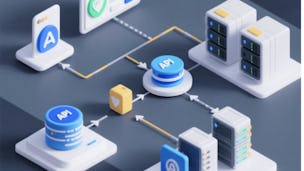Course Description
This course provides an in-depth understanding of database management systems, focusing on both SQL and NoSQL databases. Learners will explore the fundamentals of databases, including their design principles, and gain practical skills in managing databases with popular technologies such as MongoDB. The course also covers the creation of APIs, emphasizing RESTful design principles and the implementation of secure authentication and authorization methods. Through hands-on video lessons and practical exercises, participants will acquire the necessary skills to effectively manage databases and integrate them with applications. Learning Objectives Analyze the fundamental differences between SQL and NoSQL databases to determine the appropriate use cases for each technology. Create and execute basic and advanced CRUD operations in MongoDB, demonstrating proficiency in data manipulation. Design RESTful APIs that adhere to best practices for endpoint structure and security measures, including authentication and authorization. Integrate APIs into front-end applications, ensuring effective data exchange and error handling between client and server. Target Audience This course is suitable for aspiring database administrators, full-stack developers, software engineers, and anyone interested in learning database management and API integration. It is designed for both beginners and professionals looking to enhance their knowledge in database technologies. Module 1: Introduction to Databases In the first module, participants will be introduced to the foundational concepts of databases. The module begins with a discussion on what a database is and the various types of databases available today, including a comparison between SQL and NoSQL systems. Learners will gain an understanding of the essential principles of database design, which are crucial for creating efficient and scalable databases. The module then transitions into a more detailed examination of SQL databases, where participants will learn the basics of SQL, including how to write basic and advanced SQL queries. Additionally, learners will explore the concepts of database normalization and design principles, equipping them with the skills needed to construct well-structured databases. Finally, the module wraps up with an introduction to NoSQL databases, where learners will understand the key characteristics that differentiate them from SQL databases and will be introduced to MongoDB as a popular NoSQL option. Module 2: Working with MongoDB The second module delves deeper into MongoDB, a leading NoSQL database. Participants will start with an overview of MongoDB, discussing its architecture and the core concepts that underpin its operation. This includes examining the benefits and various use cases of MongoDB, which highlight its advantages in specific application scenarios. Following this introduction, the module provides a practical guide on setting up MongoDB both locally and in the cloud using MongoDB Atlas. Participants will learn how to establish connections to their databases, ensuring they can interact with MongoDB effectively. The module culminates in a hands-on exploration of basic CRUD (Create, Read, Update, Delete) operations using MongoDB. By the end of this module, learners will be proficient in creating and manipulating documents in MongoDB, a crucial skill for any developer working with NoSQL databases. Module 3: Building and Consuming APIs In the final module, the focus shifts to building and consuming APIs, a vital skill for modern web development. Participants will begin by learning the principles of RESTful API design, which provides a framework for creating scalable and maintainable web services. This section includes guidance on designing RESTful endpoints and implementing RESTful services using Express.js, a popular web framework for Node.js. The module also covers essential concepts in authentication and authorization, enabling learners to implement secure access controls within their applications. Participants will explore JWT (JSON Web Tokens) authentication and role-based access control, equipping them with the knowledge needed to protect their APIs effectively. Finally, learners will gain practical skills in consuming APIs, including how to fetch data, handle responses and errors, and integrate APIs seamlessly within front-end applications. By the end of this module, participants will have a comprehensive understanding of how to create secure and efficient APIs that facilitate data exchange in modern web applications. Disclaimer: This is an independent educational resource created by Board Infinity for informational and educational purposes only. This course is not affiliated with, endorsed by, sponsored by, or officially associated with any company, organization, or certification body unless explicitly stated. The content provided is based on industry knowledge and best practices but does not constitute official training material for any specific employer or certification program. All company names, trademarks, service marks, and logos referenced are the property of their respective owners and are used solely for educational identification and comparison purposes.














